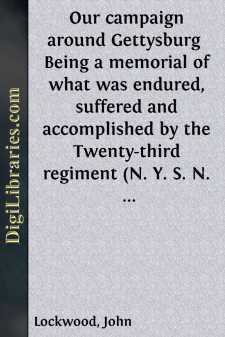Categories
- Antiques & Collectibles 13
- Architecture 36
- Art 48
- Bibles 22
- Biography & Autobiography 813
- Body, Mind & Spirit 142
- Business & Economics 28
- Children's Books 17
- Children's Fiction 14
- Computers 4
- Cooking 94
- Crafts & Hobbies 4
- Drama 346
- Education 46
- Family & Relationships 57
- Fiction 11829
- Games 19
- Gardening 17
- Health & Fitness 34
- History 1377
- House & Home 1
- Humor 147
- Juvenile Fiction 1873
- Juvenile Nonfiction 202
- Language Arts & Disciplines 88
- Law 16
- Literary Collections 686
- Literary Criticism 179
- Mathematics 13
- Medical 41
- Music 40
- Nature 179
- Non-Classifiable 1768
- Performing Arts 7
- Periodicals 1453
- Philosophy 64
- Photography 2
- Poetry 896
- Political Science 203
- Psychology 42
- Reference 154
- Religion 513
- Science 126
- Self-Help 84
- Social Science 81
- Sports & Recreation 34
- Study Aids 3
- Technology & Engineering 59
- Transportation 23
- Travel 463
- True Crime 29
Our campaign around Gettysburg Being a memorial of what was endured, suffered and accomplished by the Twenty-third regiment (N. Y. S. N. G.) and other regiments associated with them, in their Pennsylvania and Maryland campaign, during the...
by: John Lockwood
Categories:
Description:
Excerpt
PREFACE.
If any one, taking up this book casually, should wonder why it was written, it may suffice to observe that "Gettysburg" is probably destined to mark an Epoch of the Republic;—as being one of the very few decisive battles of the Great Rebellion. Accordingly, whosoever took any part in it may hope to share its immortality of glory.
But, says one, the militia were not engaged in the battle. True; neither was the reserve of eleven thousand men, under General French, at Frederick and elsewhere. Yet who would withhold from these veterans the honor of having been participators in the great struggle? They had their part to play—not so direct, nor conspicuous, nor important a part as they played whose valor won the day, yet important withal. Enough for the militia, they offered their lives for the Fatherland, and stood instant, waiting only for orders to hurry into the front of battle.
To the militia force, mainly of the cities of New York and Brooklyn, was from the first entrusted the defence of the valley of the Susquehanna. The Army of the Potomac could afford no protection to Harrisburg and the rich agricultural regions lying around it. For General Hooker, notwithstanding his vigilance and activity, had not prevented the advance corps of the enemy, under General Ewell, from penetrating to the very banks of the Susquehanna. Whether or not he cared to prevent it, is not here considered. A little later, to be sure, Lee became evidently alarmed on account of his extended line and made haste to contract it. But during the few days of panic that intervened between the first appearance of the enemy along the Susquehanna and their hasty departure therefrom, nothing stood between them and Harrisburg save the militia, whom General Halleck in his Official Report reviewing the military operations of the year 1863, saw fit to allude to as follows:—
"Lee's army was supposed to be advancing against Harrisburg, which was garrisoned by State militia, upon which little or no reliance could be placed."
York had fallen; and, notwithstanding the Mayor of that city—be his name forever buried in oblivion—went out to meet the enemy hoping doubtless to secure his favor by craven submission, a heavy ransom had been exacted for its exemption from pillage. A rebel detachment had fallen upon and put to flight the force guarding the bridge over the Susquehanna at Columbia, and thus compelled the burning of that fine structure; while Ewell with the main body of his corps was moving cautiously up toward Harrisburg. Finally, when within five miles of Bridgeport Heights, having driven in the force of skirmishers who—militia, be it observed—had for several days gallantly held in check the head of the advancing column, he halted. The state capital was a tempting prize, but scarcely worth to him the risk of a desperate battle. The gates of the city were shut, and Ewell hesitated to hurl his masses against them. It is not now pertinent to enquire what might have resulted had he chosen to attack....


